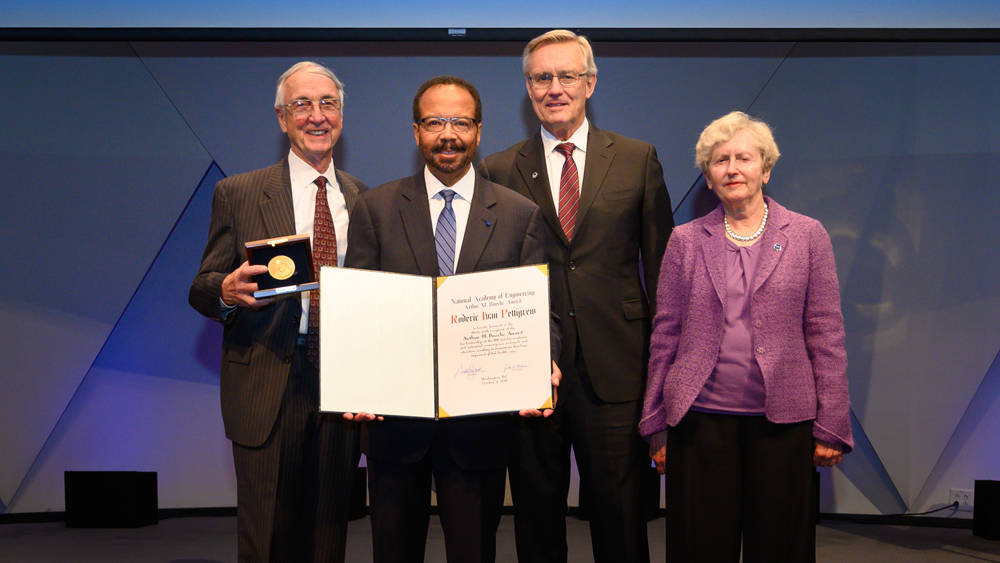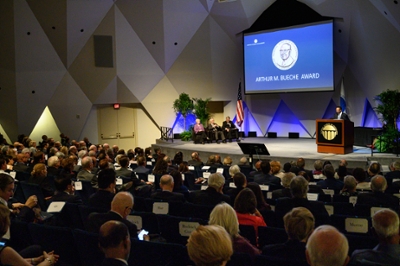
Dr. Roderic Pettigrew has been named the recipient of the 2019 National Academy of Engineering’s (NAE) Arthur M. Bueche Award for his contributions to technology research, policy, and national and international cooperation.
Pettigrew is CEO of Engineering Health (EnHealth) and executive dean for Engineering Medicine (EnMed) at Texas A&M University and Houston Methodist Hospital, as well as the Robert A. Welch Professor in the Department of Biomedical Engineering.
“Though I did not personally know Arthur Bueche, I have marveled at his history and his professional life,” Pettigrew said. “An international statesman for engineering; a steadfast advocate for science and technology; an advisor to the government and academia; a top level industrial executive; and an innovator relentlessly focused on the application of research to societal needs. Truly a man for all seasons. So, what a humbling experience to receive an award named in recognition of such a person, and what a great honor for one’s life work to be recognized by your colleagues and peers.”
The award recognizes an engineer who has shown dedication in science and technology as well as active involvement in determining U.S. science and technology policy. Pettigrew’s award was given “for leadership at the National Institutes of Health (NIH), and for academic and industrial convergence research and education, resulting in innovations that have improved global health care.” Pettigrew received the award during the NAE’s annual meeting on Oct. 6.
As CEO of EnHealth, Pettigrew leads the nation’s first comprehensive educational and research program to fully integrate engineering into all health-related disciplines. EnMed, the first constituent program, is a partnership of the Colleges of Engineering and Medicine at Texas A&M, and Houston Methodist Hospital, located in Houston’s Texas Medical Center. EnMed was created to develop a new type of invention-minded doctor or “physicianeer.” Students earn both an M.D. and M.Engineering in four years through a unique blended curriculum.
“The big driver for these new concept initiatives is to better meet societal needs in health. The driver for EnMed immediately, and EnHealth subsequently, is to accelerate the transformation in health care that technological innovation can bring,” Pettigrew said. “Engineering converged with medicine and all other disciplines of the health care ecosystem will help catalyze new fundamental discoveries and translate these discoveries into practical advances that improve well-being. The overarching goal for engineering being purposefully integrated into medicine and health care education, research and translational science, is to achieve good health for everyone everywhere for the entirety of our lives.”

Pettigrew said tomorrow’s innovation will come from the students who are trained, inspired and equipped today.
“With such training, there is no limit to the innovations their bright young minds can envision and realize. We know this. It abounds around us in other sectors of society,” Pettigrew said. “We eagerly anticipate the health care contributions to the global society that this new generation of physicianeers will create and contribute.”
He recognized the inaugural class of EnMed students and faculty as trailblazers.
“Through a well-founded and compelling new concept in medical education, it is our first implementation of an innovative initiative,” Pettigrew said. “With it, as with any first, there are risks and initiation challenges to be met. Our inaugural class is brilliant and committed, and our faculty exceptionally dedicated. This promises that our vision of EnMed and its physicianeers helping to transform the future of health will be realized.
Before coming to Texas A&M, Pettigrew served as founding director of the U.S. National Institute of Biomedical Imaging and Bioengineering (NIBIB) of the NIH, where he oversaw $5 billion in research investments and is credited with building it into the signature NIH institute for emerging medical technologies. Before his NIH appointment, he was professor of radiology at Emory University School of Medicine, professor of bioengineering at the Georgia Institute of Technology, and director of the Emory Center for Magnetic Resonance Research at Emory University in Atlanta.
Pettigrew’s accomplishments have been recognized by election to the NAE, National Academy of Medicine, National Academy of Inventors and the Indian National Academy of Sciences, as a foreign member. Other national honors include the Bennie Award for Achievement from Morehouse College, Most Distinguished Alumnus Award of the University of Miami, the Pritzker Achievement Award of the Biomedical Engineering Society, the Distinguished Service Award of the National Medical Association, the Pierre Galletti Award of the American Institute of Medical and Biological Engineering, the inaugural Gold Medal of the Academy of Radiology and Biomedical Imaging Research, University of Miami Miller Medical School Hall of Fame, the Distinguished Service Medal of the International Society of Magnetic Resonance in Medicine, the Spirit of the Heart Award of the Association of Black Cardiologists, and the Gold Medal of the Radiological Society of North America.